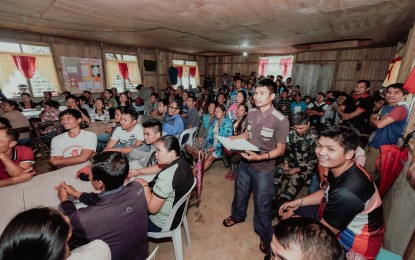
LOCALIZED PEACE EFFORTS. Photo shows a consultation done by the Provincial Task Force to End Local Communist Armed Conflict (PTF-ELCAC) in a barangay in Davao Oriental last July 22, 2019. (Photo by Davao Oriental PIO)
DAVAO CITY – With the series of consultations for the whole month of July on the localized version of Executive Order 70 to far-flung areas in Davao Oriental, villagers were given the chance to voice out their concerns and propose solutions to local officials.
Karen Lou Deloso, Provincial Information Officer of Davao Oriental, on Saturday said the implementation of the anti-insurgency order's localized version, Executive Order 13, issued by Governor Nelson Dayanghirang, was able to convene various sectors of the community which include women, youth, indigenous peoples, senior citizens, business groups, and farmers who listed down their urgent concerns with the government.
Deloso added that the main gaps and issues which quickly emerged are those commonly shared by most marginalized and remote communities.
This includes poor road condition, lack of vital infrastructures such as water systems, electricity, housing, and school facilities; lack of livelihood opportunities, skills training, and other basic services.
Just recently, Deloso said they have rolled out the fourth round of the implementation of its localized version wherein villagers from four hinterland sub-villages of Tiombocan, Bislong, Cabugayan, and Matigdao in Barangay Marayag in the municipality of Lupon, Davao Oriental participated in the Multi-sectoral Inclusive and Participatory Barangay Development Workshop.
“Armed with sheer determination to achieve durable and lasting peace, the Provincial Task Force to End Local Communist Armed Conflict (PTF-ELCAC) has been highlighting the inclusion and people’s participation at the heart of all its peace and development efforts through President Rodrigo Duterte’s “Whole-of-Nation” Approach,” she added.
Among the interventions committed by the agencies were the processing of the Certificate of Ancestral Domain Title, assistance for planting falcata trees and crops, provision of public toilets, Materials Recovery Facility, a corn milling facility, facilitation of driver’s license through special accommodation, construction of water systems, facilitation of the creation of cooperatives, accreditation of People’s Organizations to avail of livelihood assistance and enabling them to sit down in local special bodies, provision of livelihood projects and agriculture-based training such as tilapia and poultry production, and training in abaca disease prevention, among many others.
“Hearing out the community’s concerns in one setting, the participating government agencies said that they were able to appreciate the beauty of convergence as they come up with concrete proposed interventions that are not only tangible steps to alleviate conflict but also complement other agencies’ programs, thus, avoiding duplication and waste of government resources,” Provincial Task Force to End Local Communist Armed Conflict (PTF-ELCAC) Vice Chairman, Ednar Dayanghirang, said.
Meanwhile, the Philippine Army, the lead agency for peace and security, is “confident” that all these collective efforts would eventually lead to transformative change in the communities, thus, would finally end the 52-year-old communist insurgency.
Col. Oliver Maquiling, 701st Brigade Deputy Commander of the Philippine Army, asked the villagers to help the government in its effort to achieve true peace.
He urged the villagers to inform those who are still in the movement to avail of the government benefits for rebel surrenderers through the Enhanced Comprehensive Local Integration Program (E-CLIP).
“Tackling insurgency alone is not enough. We need to address its roots. We are thankful of the government’s new approach to go down to the grassroots. Through this, we can now focus on our main duty which is to provide a secured environment for all,” Maquiling said. (PNA)
